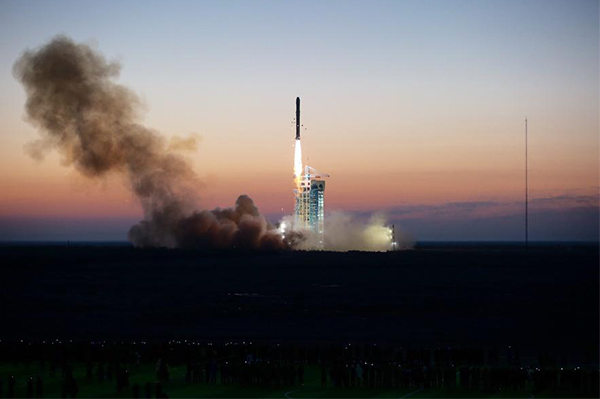China successfully launches its first dark matter satellite
By Cheng Yingqi (chinadaily.com.cn) Updated: 2015-12-17 09:44
China's Dark Matter Particle Explorer Satellite was successfully launched at the Jiuquan Satellite Launch Center in Gansu province on Thursday.
At 8:12 am, the carrier Long March 2-D rocket blasted off, sending the satellite into the sun-synchronous orbit.
After three months' on-orbit test, the Dark Matter Particle Explorer Satellite (DAMPE) will be in service for three years to observe the direction, energy and electric charge of high-energy particles in space in search of dark matter.
Designed in the shape of a one-cubic-meter box weighing 1.9 metric tons, DAMPE carries four probes that coordinate with each other to search for signs of dark matter, which gives the satellite the widest observation spectrum and highest energy resolution of any dark matter probe in the world.
First postulated in the 1930s, dark matter is believed to make up 85 percent of the matter in the cosmos and 27 percent of the known universe - but only theoretically, as it has never been observed by any instruments.
So far scientists have little knowledge on dark matter, but many believe dark matter as the key to help us understand phenomena that could not be explained with current knowledge in physics.
Besides searching dark matter, the satellite will also be used to study the origin of cosmic rays and observe high-energy gamma rays.
DAMPE is the first satellite of a scientific satellite series the Chinese Academy of Sciences plans to launch in the coming two years, which include a retrievable scientific research satellite, a satellite for quantum science experiments, and a hard X-ray telescope for black hole and neutron star studies.
- Physicists on cutting edge in search for dark matter
- China aims to expand global FTA network
- Year's worst smog coming to north China
- China launches satellite to shed light on invisible dark matter
- China strongly opposes US arms sale to Taiwan
- Report: Layoffs may loom next year
- Pandas prefer choosing their own sex partners, researchers find
- Cyberspace door stays open, says watchdog chief
- China to spend $93b relocating 10 million people
- PM2.5 emission should be cut by half to meet national standard








